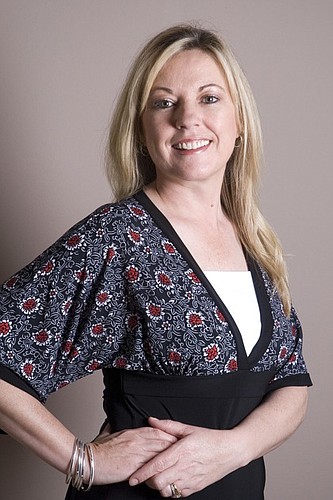- November 24, 2024
-
-
Loading

Loading

Dresses with plunging necklines may be fine for a night on the town, but not at work.
Michelle De Sousa ran into this problem when she was working for a Naples homebuilder. As a project administrator, she was always spreading out plans on big tables. “You bend over and working with men...” she trails off, eyebrows raised.
Instead of leaving her low-cut dresses in the closet, De Sousa wore tank tops underneath. But as ladies know, tank tops need constant readjusting.
So one day in 2007, De Sousa cut a strip of cloth out of an old shirt and attached it to her bra using snaps. That's when Cleava, the snap-to-bra camisole, was born.
With her husband, J.D. De Sousa, the couple quietly started marketing their product to women's dress boutiques. They had a Chinese manufacturer make 500 and they sold out in one month.
TVSN, an Australian television-shopping network, ordered 400 Cleavas and sold out in one day. Recently, the channel ordered another 800.
Over 100 boutiques now carry Cleava because it helps their sales people overcome objections from customers who say a dress may show too much cleavage for work. With a Cleava, they sell the dress and the $20 cleavage cover-up.
The entrepreneurial couple emigrated to the U.S. in 1993 from South Africa with just $7,000. They moved to the San Francisco area, where J.D. De Sousa built a thriving locksmith business starting in 1995. The company had 25 employees and $1.3 million in annual sales by the time he sold it in 2004 and the couple moved to Naples. “Doing business in California was just getting ridiculous,” J.D. De Sousa says.
Now, both work full-time on Cleava, which had $100,000 in sales last year from retailers and their Web site Cleava.com. But their success has attracted copycats who now sell inferior-quality products for a fraction of the price.
Problem is, there's not much the De Sousas can do until their pending patent is approved. In hindsight, they say they would have launched a massive public relations and advertising effort right from the start. Instead, they were too cautious while they waited for their patent to be approved, hoping competitors wouldn't copy the product.
But copycats pounced on their idea and the De Sousas speculate it happened at one of the trade shows they attended. Meanwhile, the couple has spent $40,000 in attorneys' fees and they're still waiting for patent approval. They hope it comes within the next three months, at which time an attorney in Miami has promised to pursue the copycats on contingency. “They outright hijacked the product,” Michelle De Sousa says.
Despite the setbacks, J.D. De Sousa says the company is on track to double sales this year to $200,000. He's been trying to find investors to raise $500,000 to $1 million to help him implement an advertising blitz. “We need good publicity,” he says.